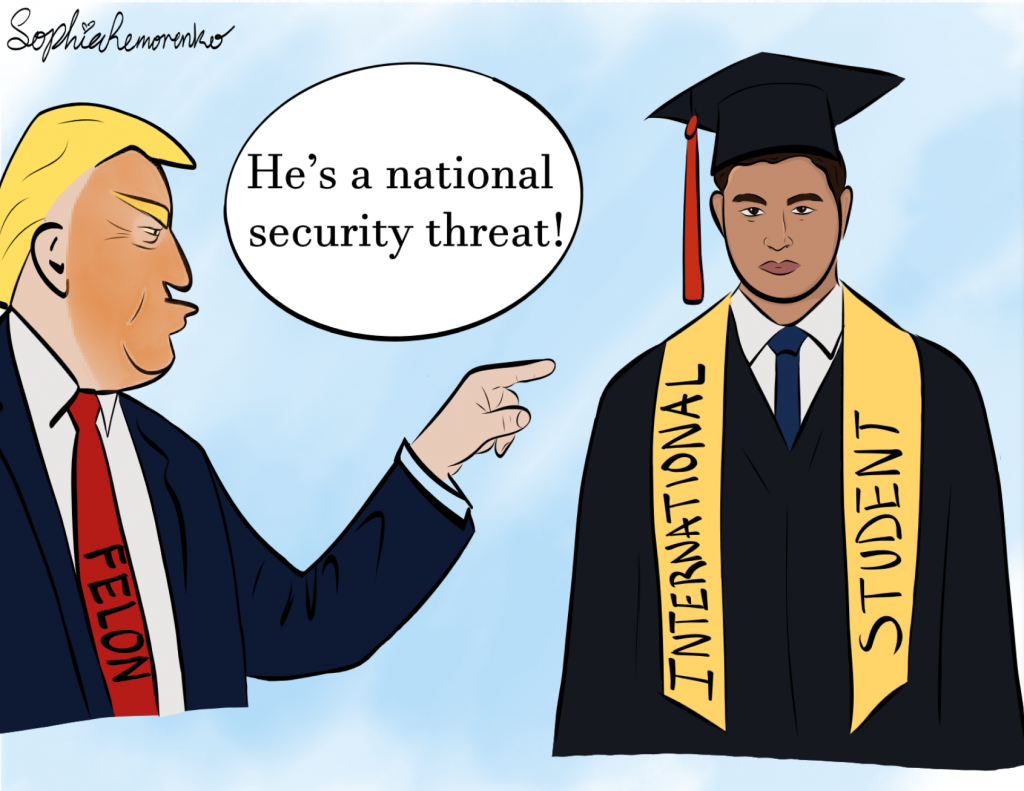
Author Archives | Daniel Epstein
Don’t stretch the process — fix it
Posted on 02 May 2025.
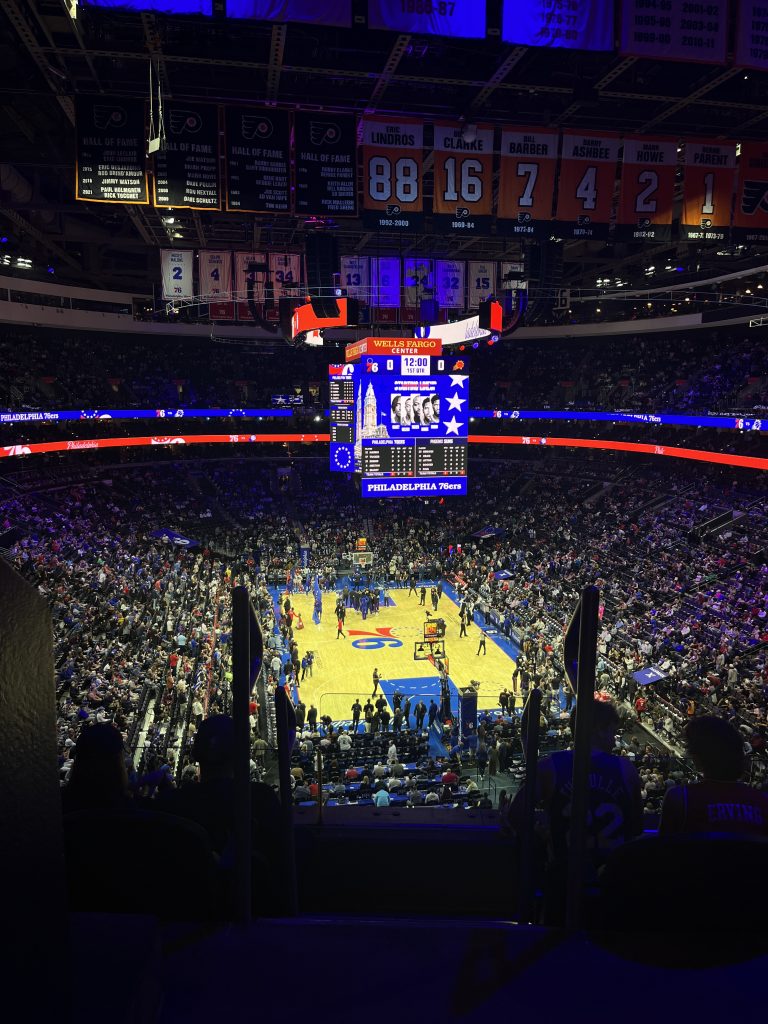
After a brutal 24-58 season that saw the Philadelphia 76ers fall to 13th in the Eastern Conference, the team once again finds itself at a crossroads. Managing an aging roster, glaring weaknesses on both ends of the court and ensuring their players stay healthy, Daryl Morey and the front office must avoid falling back into the “Trust the Process” timeline.
Coming off one of the most anticipated seasons in 76ers history, the franchise has $65 million in salary cap and a shot at a top five pick in the upcoming draft. However, this comes with the major downside of their two stars’ aging timelines, with both Embiid and George inching closer towards the end of their primes and injuries getting in their way. This makes the objective clear: Do not stretch the process — fix it.
Retention is key. After Grimes’s standout season as a 3&D Wing, keeping him in Philadelphia is critical. As Paul George nears the end of his prime, Grimes can eventually step into the starting role. Additionally, bringing back the core group, which includes standout role players such as Guerschon Yabusele, Jared Butler and Justin Edwards is a no-brainer after their strong season.
On the more controversial end, Joel Embiid’s time as the prized jewel of the team is coming to its end. When healthy, he is a top 10 player in the league. However, recently his window has been shut off more than ever before with reported leadership issues rising in practice and injuries raising the question of whether he is fit enough to play back-to-back games. Keeping the youth movement within the starting core would be in the 76ers’ best interest.
Passing the torch to their younger stars, like Maxey and McCain, could prove worthwhile and spark a culture shift in the City of Brotherly Love. Additionally, doing this while building around Embiid to make sure his absence in games would not disrupt business as usual.
This season, the Sixers ranked 26th in defense and 23rd in offense, marking improvement in rebounding, and playmaking their top priorities for the upcoming season.
To address the problem, the 76ers can look into the free agent market. Clint Capela, who is on an expiring contract with the Hawks, could offer the Sixers much-needed rim protection and bolster their defense, especially in games when Embiid is unavailable.
Another aspect where the Sixers can improve is their playmaking. Currently, the Sixers heavily rely on an individual player to dictate ball movement throughout their lineup. Hence why signing a sixth-man caliber player like Tyus Jones, Russell Westbrook or Dennis Schroeder could help fill the offensive gap while additionally providing veteran depth off the bench.
The goal is to build a rotation that can switch, defend and run without depending on aging starters. Philadelphia finds themselves dangerously close to squandering the very foundation they spent years building. This offseason marks a reset of the 76ers’ identity.
Posted in UncategorizedComments Off on Don’t stretch the process — fix it
Assessing the Phillies’ questionable start to the season
Posted on 02 May 2025.
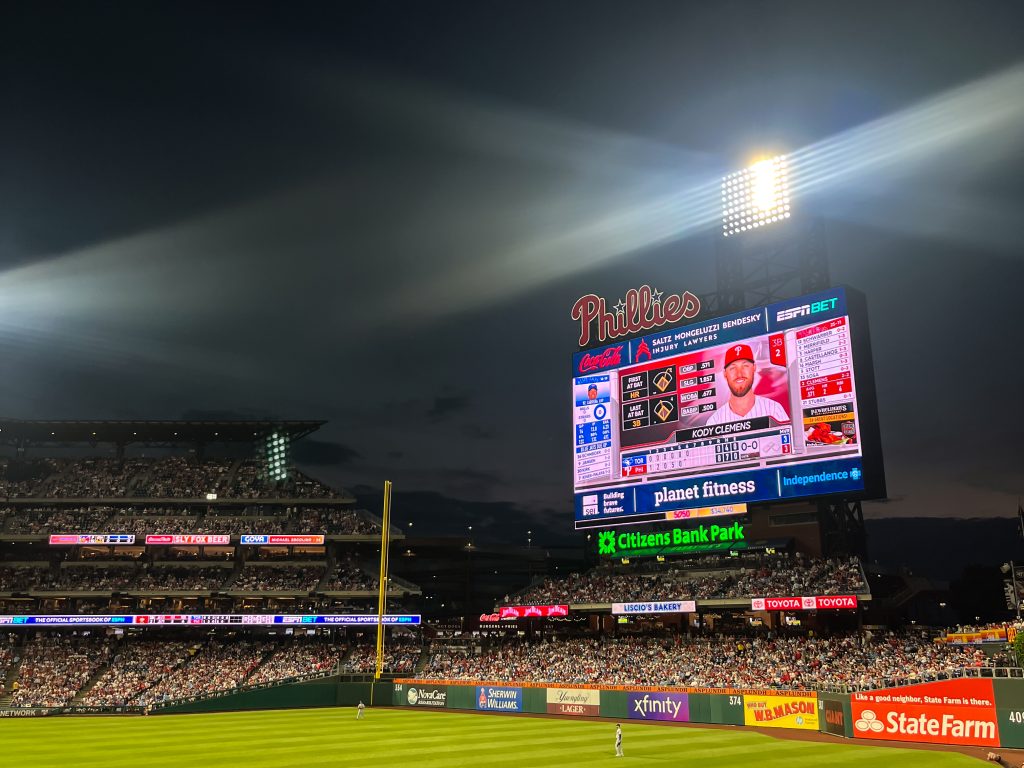
The Phillies came into the 2025 season with no major upgrades to the core at the center of their playoff teams from 2022-2024, hoping moves around the margins and prospects in the wings would eventually be enough to put the team over the hump. After 28 games, it appears Phillies’ general manager Dave Dombrowski and Co. may have been slightly too optimistic.
Sitting at 15-13 and second place in the NL East, it has not been the opening to the season many would have hoped for. The team has been a notorious slow starter, yes, but that does not mean Philadelphia wants to be handing away winnable games early in the season.
On that note, the Phillies are currently 2nd in MLB in save opportunities, similarly they lead the league with seven blown saves. This is both good and bad news. On a good note, it means the team is in position to win games. However, the bad news is the bullpen has been significantly worse than last season. Free agent acquisition, Jordan Romano, has been far from the quality of player Jeff Hoffman, who signed with Toronto this offseason and it has cost the team multiple games. In a division as competitive as the NL East, every game – even this early – matters. Therefore, this is something that will have to be addressed.
The starting pitching has been mostly solid – with the exception of a poor start from Aaron Nola – but it will have to be better if it wants to earn the title of “best rotation in baseball” as many crowned them this offseason. Zack Wheeler and Christopher Sanchez have also slightly underperformed expectations, both with earned run average in the mid-threes. Reinforcements should be coming soon, with Ranger Suarez almost set to return from injury,and top prospect Andrew Painter looking at a “July-ish” (Dombrowski’s words) call-up.
The offense has been league average (sensing a theme?) so far at 14th in MLB with 4.43 runs per game. With a payroll in the top three of the league, this is unacceptable, especially when the stars of the team are paid to score runs. That will have to improve, along with Bryce Harper’s overall numbers. At a .231 average with five home runs and 16 runs batted in, Harper has struggled to open his 2025 campaign. He is known to get scorching hot at any moment, though, so those numbers could look totally different in a matter of weeks.
Overall, things are not terrible for Philadelphia, but they certainly are not great. The Phillies seem to be relying on their starting pitching and hitting to return to normal (as in 2024 regular season level), and maybe look to add a bullpen upgrade at the deadline with the prospect capital they have. They can not just expect a slow start to be fixed every season, though, so things need to get going, and fast, if the team wants to compete this year.
Posted in UncategorizedComments Off on Assessing the Phillies’ questionable start to the season
Don’t stretch the process — fix it
Posted on 02 May 2025.

After a brutal 24-58 season that saw the Philadelphia 76ers fall to 13th in the Eastern Conference, the team once again finds itself at a crossroads. Managing an aging roster, glaring weaknesses on both ends of the court and ensuring their players stay healthy, Daryl Morey and the front office must avoid falling back into the “Trust the Process” timeline.
Coming off one of the most anticipated seasons in 76ers history, the franchise has $65 million in salary cap and a shot at a top five pick in the upcoming draft. However, this comes with the major downside of their two stars’ aging timelines, with both Embiid and George inching closer towards the end of their primes and injuries getting in their way. This makes the objective clear: Do not stretch the process — fix it.
Retention is key. After Grimes’s standout season as a 3&D Wing, keeping him in Philadelphia is critical. As Paul George nears the end of his prime, Grimes can eventually step into the starting role. Additionally, bringing back the core group, which includes standout role players such as Guerschon Yabusele, Jared Butler and Justin Edwards is a no-brainer after their strong season.
On the more controversial end, Joel Embiid’s time as the prized jewel of the team is coming to its end. When healthy, he is a top 10 player in the league. However, recently his window has been shut off more than ever before with reported leadership issues rising in practice and injuries raising the question of whether he is fit enough to play back-to-back games. Keeping the youth movement within the starting core would be in the 76ers’ best interest.
Passing the torch to their younger stars, like Maxey and McCain, could prove worthwhile and spark a culture shift in the City of Brotherly Love. Additionally, doing this while building around Embiid to make sure his absence in games would not disrupt business as usual.
This season, the Sixers ranked 26th in defense and 23rd in offense, marking improvement in rebounding, and playmaking their top priorities for the upcoming season.
To address the problem, the 76ers can look into the free agent market. Clint Capela, who is on an expiring contract with the Hawks, could offer the Sixers much-needed rim protection and bolster their defense, especially in games when Embiid is unavailable.
Another aspect where the Sixers can improve is their playmaking. Currently, the Sixers heavily rely on an individual player to dictate ball movement throughout their lineup. Hence why signing a sixth-man caliber player like Tyus Jones, Russell Westbrook or Dennis Schroeder could help fill the offensive gap while additionally providing veteran depth off the bench.
The goal is to build a rotation that can switch, defend and run without depending on aging starters. Philadelphia finds themselves dangerously close to squandering the very foundation they spent years building. This offseason marks a reset of the 76ers’ identity.
Posted in UncategorizedComments Off on Don’t stretch the process — fix it
Drexel backs down on food truck crackdown
Posted on 11 April 2025.
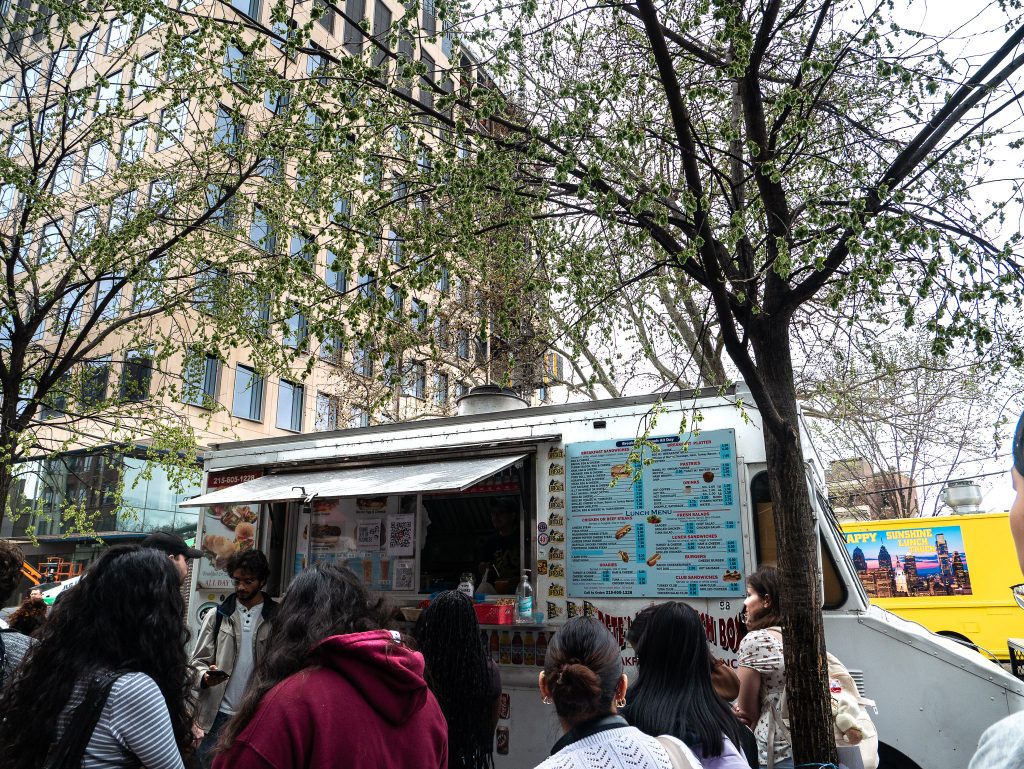
After Drexel’s recent decision to start prohibiting food trucks on campus from parking overnight was met with heavy backlash, Drexel has stopped issuing citations for mobile vendors parked overnight, allowing Pete’s Little Lunch Box, Happy Sunshine, Kami and other trucks to remain open in their usual spot.
In a short meeting with Drexel’s Undergraduate Student Government Association, Project 26 at Drexel and student leader Claire Toomey today, Chief Mel Singleton revealed that Drexel University Police Department (DUPD) will not be issuing any more citations specifically for overnight parking, but would instead leave that up to the Department of License and Inspections. However, DUPD will continue to enforce laws regarding proper propane tank handling and other safety concerns.
Additionally, Brian Keech, Karen Lewis and the Office of Government and Community Relations, are in open communication with councilmember Jamie Gauthier’s office. They urged Drexel students to continue pressuring the city to pass these bills further protecting mobile vendors.
To fulfill her promise to protect Drexel University’s Food Trucks, councilmember Gauthier introduced two new pieces of legislation at the Stated Meeting of Philadelphia City Council on April 10. The first is an ordinance to amend subsection 9-203 of the Philadelphia code to allow food trucks to park overnight. The second is an ordinance for the city to reclaim the 3100 block of Ludlow Street, colloquially known as “Food Truck Alley.”
These bills have just been introduced, and still need to be reviewed by the appropriate committees and voted on before becoming laws. Although the situation has not reached a full resolution, for now, it’s back to business as usual for the beloved food trucks all around campus.
Posted in UncategorizedComments Off on Drexel backs down on food truck crackdown
Save the food trucks
Posted on 08 April 2025.
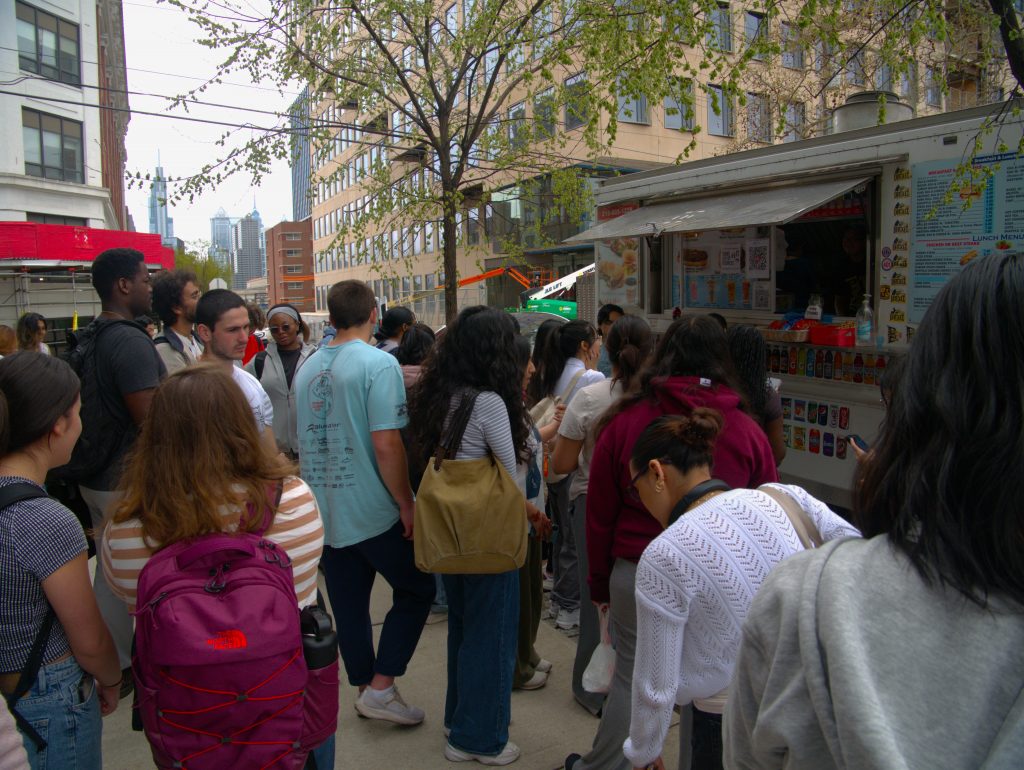
As the Triangle previously reported, Drexel University has suddenly decided to enforce a city code prohibiting mobile street vendors from parking overnight.
In a meeting with the Undergraduate Student Government Association, senior Drexel leaders including the Vice President of Public Safety Mel Singleton and Senior Vice President of Government and Community Relations Brian Keech claimed that this action was necessary due to concerns about complaints against food truck operators, propane tank explosions, potential sanitation issues, pedestrian safety on 34th St. and the inability of police to clear a street in the event of an emergency.
As pointed out in Monday night’s forum, cracking down on food truck compliance will do little to nothing to solve these concerns. Jaywalking and flagrant traffic violations have been a problem on that particular block of 34th St. for years predating the arrival of these trucks. Although students would appreciate efforts to make it easier to cross the street, removing food trucks from the street does nothing to make crossing easier because the same amount of cars will be zooming down the street.
Jaywalkers cross the street understanding and accept the dangers of doing so. Concerns with food trucks obscuring pedestrians’ views of the street are flawed because they do not consider the frequent supply and mail trucks that use that shoulder to park anyway. Even if these new food trucks were entirely to blame for the safety concerns, preventing food trucks from staying overnight does not solve these problems from 7 a.m. to midnight when the trucks can legally operate.
Another reason Drexel is concerned about the trucks parking overnight is their ability to clear streets in an emergency. It is highly suspicious that Drexel is raising concerns about this now, when trucks like Pete’s Little Lunch Box have been operating for 17 years. In the event that the police need to clear a street, the police would need to find the owners of every car parked on the side and order them to leave. This task is obviously easier when the owner of the vehicle is going about their business inside their vehicle rather than somewhere that could be impossible to determine in an emergency.
During the pro-Palestine encampment last summer, Drexel and Philadelphia Police were able to successfully clear out 33rd St. next to the Papadakis Integrated Sciences Building even with the food trucks that were operating there. If there was a real public safety issue that arose during that incident, why is Drexel trying to address it an entire year later?
In addition to safety issues, Drexel leaders also pointed out that the police have been called to address complaints about certain vendors. One example was a vendor that would use a public restroom to wash himself (not his pans). The obvious solution to this is to deal with the individual, not collectively punish every food truck on campus. The Drexel Crime Log and Fire Report also shows zero incidents related to food trucks within the past three months.
Supposedly, when the vendors go home at night, they take their food truck to their home or a commissary to clean and restock. Of course, there is no way to know whether the vendors have actually cleaned their trucks. In fact, forcing them to move overnight will make it even less likely that they clean their vehicles because they will have to wake up extra early in the hopes of securing a parking spot and may be too lazy to do any thorough cleaning.
Another supposed benefit of forcing food trucks to relocate after 12:30 a.m. is that it will lead to vendors getting their food trucks cleaned more often. There is no real evidence to support this and, in our view, relocation with no assurance of a spot to park every morning is more of an inconvenience and strain on the resources of the food trucks. Hence, it is sufficient that the food trucks are subject to the requirements of the Health Code.
During the USGA meeting, Chief Singleton also said that vendors leaving propane tanks out on the sidewalk is unsafe and illegal because they might explode and hurt others. He cited an incident at Temple University where a propane tank in a food truck exploded. Once again, it is unclear how forcing food trucks out overnight will solve these issues given that these issues are still present during the day. More concerningly, the Chief of Police and the Senior Vice President of Government and Community Relations seem to completely misunderstand the law as Phila. Code §9-203(11)(b) explicitly states that “no propane or natural gas tanks shall be…stored inside the vehicle.” The issue of potential chain reactions of explosions is already mitigated by a different section of the law requiring a minimum 30 feet distance between food trucks.
It is extremely telling that the food trucks between the Main Building and the Bossone Research Center remain undisturbed. Those trucks do not move and are almost bumper-to-bumper. It is also on private property, meaning that Drexel is responsible for maintaining safety in that area. Meanwhile, the sidewalks where Drexel plans to enforce the overnight rule are public property.
Drexel leaders attempted to shift blame onto the City Council. Claiming that Drexel Police was merely enforcing existing law, Chief Singleton encouraged students to petition the councilwoman and council members-at-large to change the law. While that is not a false statement as previous efforts to restrict food trucks on campus failed after petitions to the city, Drexel is not helpless.
Police are given the discretion to enforce a law or not. Drexel Police uses this power when, for example, it does not enforce a law requiring the food trucks to have trash cans available (Phila. Code §9-201(7)(c)). Drexel has set a precedent of not enforcing this law, and has the full power to continue to do so, despite their claims.
City Councilwoman Jamie Gauthier, representing University City, supports food trucks and the small business community as a whole. Gauthier encouraged Drexel to listen to the vendors and their students while she works on a legislative solution.
Chief Singleton has clarified that Drexel is not forcing anyone to move. The police are merely issuing code violation notices, but theoretically, the vendors could continue paying the fines and not move. This is akin to stating that Drexel does not force non-commuters to live on campus for two years; students could simply pay for a room at Kelly Hall but actually live wherever they want. If Drexel really does care about their food trucks as they claim, they should understand the detriment the fines pose to these small businesses.
Competition for parking space on campus is fierce, and finding enough space for trucks every day can be a difficult challenge. Most trucks will likely fail to find parking space. Many trucks will lose their customer base and take their business elsewhere. With less food trucks on campus, there is less competition for student demand, making it easier to raise prices. Students will miss out on a valuable component of campus life as these food trucks provide a much needed affordable dining option. The enforcement of the overnight rule is merely a pretense to achieve the result of kicking the food trucks off campus.
Drexel administration claimed to be working on the issue, and that they have considered turning the lot behind the Academic Building into another private space reserved for trucks, or reserving parking spots for the trucks while they leave overnight, but have not implemented anything yet. If Drexel truly cares about their food trucks, why are the fines and citations that cripple the trucks preceding the solution that helps the trucks stay in business on campus?
The Drexel administration must take responsibility for this action and stop pretending that they are not forcing food trucks off our campus. If it was not for Drexel’s new mandate, food trucks like Pete’s Little Lunch Box and Happy Sunshine would likely continue operating as they have for over a decade. Drexel should recognize that these food trucks are an important part of campus life and preserve these trucks and the great food they provide to our students. Meanwhile, students can help by signing a petition to save the food trucks.
Posted in UncategorizedComments Off on Save the food trucks
Save the food trucks
Posted on 08 April 2025.

As the Triangle previously reported, Drexel University has suddenly decided to enforce a city code prohibiting mobile street vendors from parking overnight.
In a meeting with the Undergraduate Student Government Association, senior Drexel leaders including the Vice President of Public Safety Mel Singleton and Senior Vice President of Government and Community Relations Brian Keech claimed that this action was necessary due to concerns about complaints against food truck operators, propane tank explosions, potential sanitation issues, pedestrian safety on 34th St. and the inability of police to clear a street in the event of an emergency.
As pointed out in Monday night’s forum, cracking down on food truck compliance will do little to nothing to solve these concerns. Jaywalking and flagrant traffic violations have been a problem on that particular block of 34th St. for years predating the arrival of these trucks. Although students would appreciate efforts to make it easier to cross the street, removing food trucks from the street does nothing to make crossing easier because the same amount of cars will be zooming down the street.
Jaywalkers cross the street understanding and accept the dangers of doing so. Concerns with food trucks obscuring pedestrians’ views of the street are flawed because they do not consider the frequent supply and mail trucks that use that shoulder to park anyway. Even if these new food trucks were entirely to blame for the safety concerns, preventing food trucks from staying overnight does not solve these problems from 7 a.m. to midnight when the trucks can legally operate.
Another reason Drexel is concerned about the trucks parking overnight is their ability to clear streets in an emergency. It is highly suspicious that Drexel is raising concerns about this now, when trucks like Pete’s Little Lunch Box have been operating for 17 years. In the event that the police need to clear a street, the police would need to find the owners of every car parked on the side and order them to leave. This task is obviously easier when the owner of the vehicle is going about their business inside their vehicle rather than somewhere that could be impossible to determine in an emergency.
During the pro-Palestine encampment last summer, Drexel and Philadelphia Police were able to successfully clear out 33rd St. next to the Papadakis Integrated Sciences Building even with the food trucks that were operating there. If there was a real public safety issue that arose during that incident, why is Drexel trying to address it an entire year later?
In addition to safety issues, Drexel leaders also pointed out that the police have been called to address complaints about certain vendors. One example was a vendor that would use a public restroom to wash himself (not his pans). The obvious solution to this is to deal with the individual, not collectively punish every food truck on campus. The Drexel Crime Log and Fire Report also shows zero incidents related to food trucks within the past three months.
Supposedly, when the vendors go home at night, they take their food truck to their home or a commissary to clean and restock. Of course, there is no way to know whether the vendors have actually cleaned their trucks. In fact, forcing them to move overnight will make it even less likely that they clean their vehicles because they will have to wake up extra early in the hopes of securing a parking spot and may be too lazy to do any thorough cleaning.
Another supposed benefit of forcing food trucks to relocate after 12:30 a.m. is that it will lead to vendors getting their food trucks cleaned more often. There is no real evidence to support this and, in our view, relocation with no assurance of a spot to park every morning is more of an inconvenience and strain on the resources of the food trucks. Hence, it is sufficient that the food trucks are subject to the requirements of the Health Code.
During the USGA meeting, Chief Singleton also said that vendors leaving propane tanks out on the sidewalk is unsafe and illegal because they might explode and hurt others. He cited an incident at Temple University where a propane tank in a food truck exploded. Once again, it is unclear how forcing food trucks out overnight will solve these issues given that these issues are still present during the day. More concerningly, the Chief of Police and the Senior Vice President of Government and Community Relations seem to completely misunderstand the law as Phila. Code §9-203(11)(b) explicitly states that “no propane or natural gas tanks shall be…stored inside the vehicle.” The issue of potential chain reactions of explosions is already mitigated by a different section of the law requiring a minimum 30 feet distance between food trucks.
It is extremely telling that the food trucks between the Main Building and the Bossone Research Center remain undisturbed. Those trucks do not move and are almost bumper-to-bumper. It is also on private property, meaning that Drexel is responsible for maintaining safety in that area. Meanwhile, the sidewalks where Drexel plans to enforce the overnight rule are public property.
Drexel leaders attempted to shift blame onto the City Council. Claiming that Drexel Police was merely enforcing existing law, Chief Singleton encouraged students to petition the councilwoman and council members-at-large to change the law. While that is not a false statement as previous efforts to restrict food trucks on campus failed after petitions to the city, Drexel is not helpless.
Police are given the discretion to enforce a law or not. Drexel Police uses this power when, for example, it does not enforce a law requiring the food trucks to have trash cans available (Phila. Code §9-201(7)(c)). Drexel has set a precedent of not enforcing this law, and has the full power to continue to do so, despite their claims.
City Councilwoman Jamie Gauthier, representing University City, supports food trucks and the small business community as a whole. Gauthier encouraged Drexel to listen to the vendors and their students while she works on a legislative solution.
Chief Singleton has clarified that Drexel is not forcing anyone to move. The police are merely issuing code violation notices, but theoretically, the vendors could continue paying the fines and not move. This is akin to stating that Drexel does not force non-commuters to live on campus for two years; students could simply pay for a room at Kelly Hall but actually live wherever they want. If Drexel really does care about their food trucks as they claim, they should understand the detriment the fines pose to these small businesses.
Competition for parking space on campus is fierce, and finding enough space for trucks every day can be a difficult challenge. Most trucks will likely fail to find parking space. Many trucks will lose their customer base and take their business elsewhere. With less food trucks on campus, there is less competition for student demand, making it easier to raise prices. Students will miss out on a valuable component of campus life as these food trucks provide a much needed affordable dining option. The enforcement of the overnight rule is merely a pretense to achieve the result of kicking the food trucks off campus.
Drexel administration claimed to be working on the issue, and that they have considered turning the lot behind the Academic Building into another private space reserved for trucks, or reserving parking spots for the trucks while they leave overnight, but have not implemented anything yet. If Drexel truly cares about their food trucks, why are the fines and citations that cripple the trucks preceding the solution that helps the trucks stay in business on campus?
The Drexel administration must take responsibility for this action and stop pretending that they are not forcing food trucks off our campus. If it was not for Drexel’s new mandate, food trucks like Pete’s Little Lunch Box and Happy Sunshine would likely continue operating as they have for over a decade. Drexel should recognize that these food trucks are an important part of campus life and preserve these trucks and the great food they provide to our students. Meanwhile, students can help by signing a petition to save the food trucks.
Posted in UncategorizedComments Off on Save the food trucks
Councilwoman Gauthier rebukes city responsibility in Drexel’s food truck crackdown
Posted on 04 April 2025.
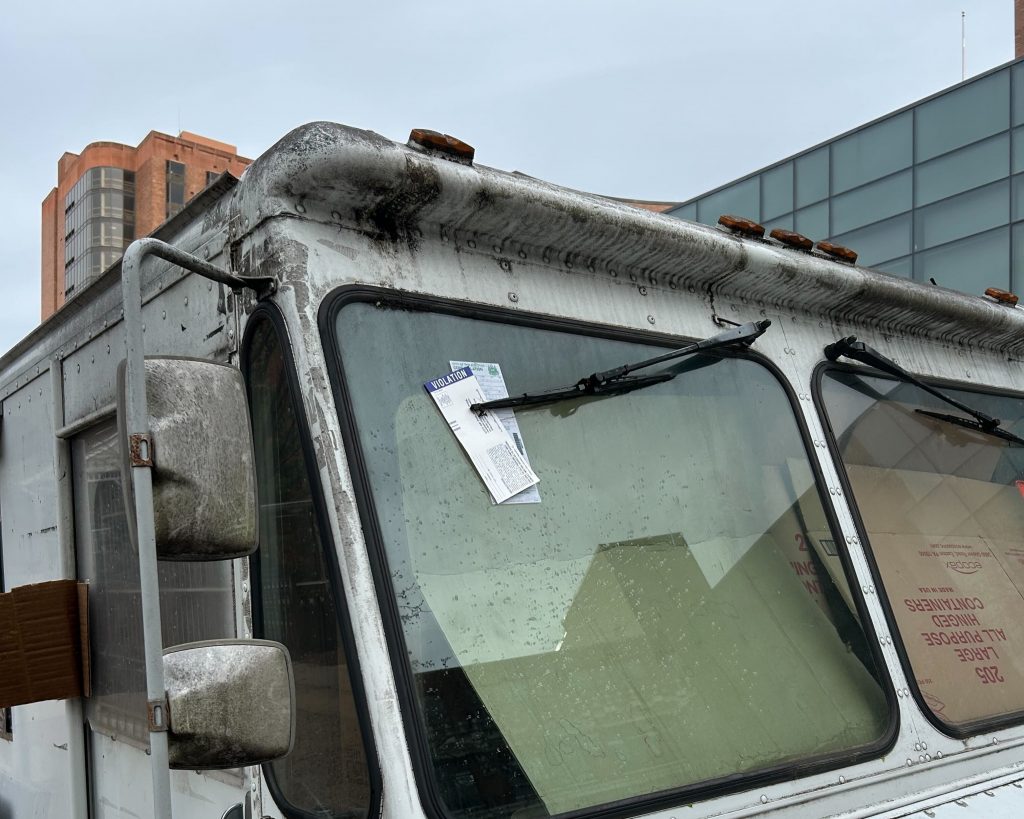
After Drexel attributed their actions regarding campus food trucks to the longstanding laws of Philadelphia and urged students to reach out to the Philadelphia City Council, District 3 councilmember Jamie Gauthier responded that Drexel was not being told to enforce these laws. She instead urged the university to listen to its students and community.
Gauthier explained that while the city does have a law preventing food trucks from parking overnight, it is intentionally enforced selectively. This statement contradicts claims made by the Drexel administration at Monday’s forum that the lack of enforcement was purely due to a lack of resources in the PPA and city police.
In an interview with Fox News, she expressed disappointment and frustration with Drexel for not listening to their students and targeting these food trucks.
“I was somewhat dismayed that they were telling the student community this was because of something that I did,” Gauthier stated. “I would never be a part of any movement to push food trucks off of the campus and in fact I would hope that Drexel would reverse course on this but if they don’t, I’m going to be exploring legislative options to make sure we continue to welcome food trucks to West Philadelphia.”
The City’s Department of Licenses and Inspections, another group cited by Drexel to be a key player in this situation, told Fox News that “Drexel University is performing the enforcement, so they would be the appropriate contact.”
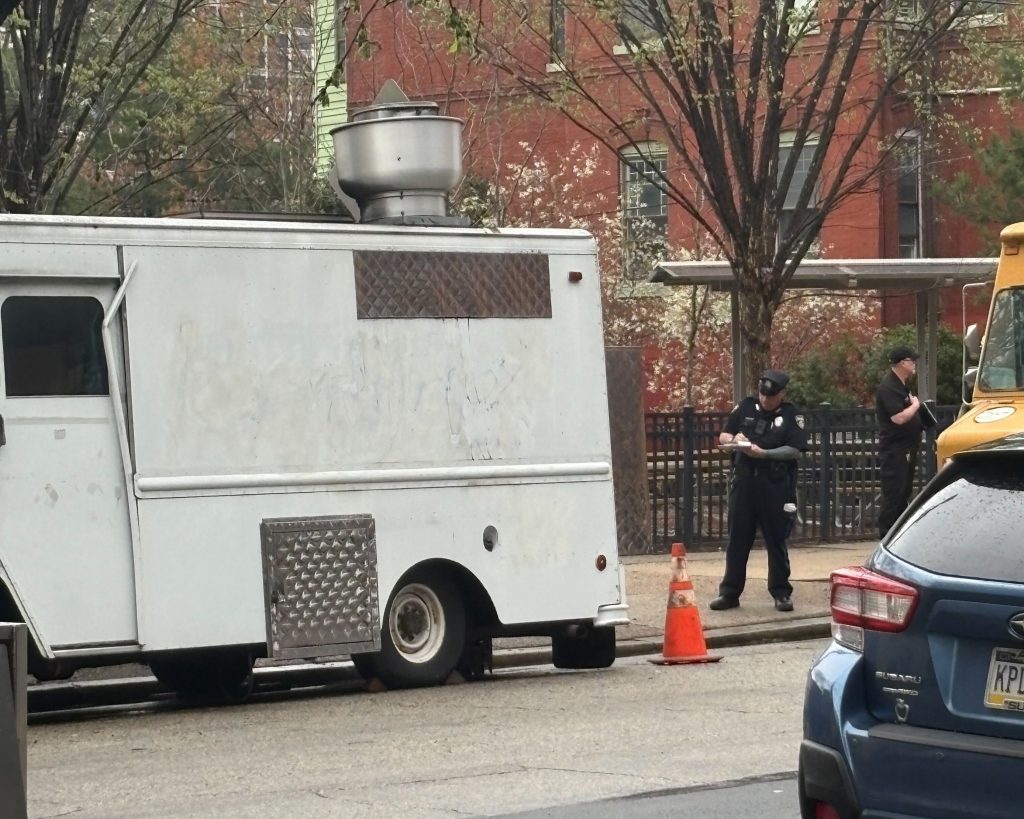
Gauthier followed this interview with a post on Instagram further pressing Drexel to stop targeting these beloved campus food establishments. Drexel University’s Undergraduate Student Government Association also posted an update on their Instagram featuring a video from Gauthier speaking out about City Council’s role in the situation.
Several food trucks around campus already received fines, some as early as 12:39 a.m. this morning.
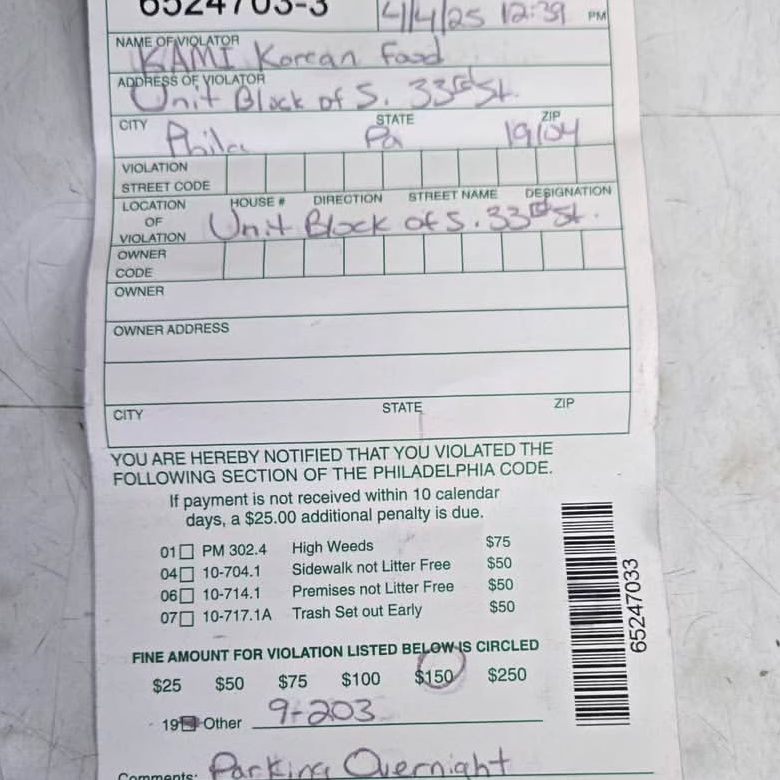
Pete’s Little Lunch Box, Kami, Happy Sunshine, and other food trucks around campus have reported receiving fines of $150 this morning. According to several students, plans for a formal protest are in development.
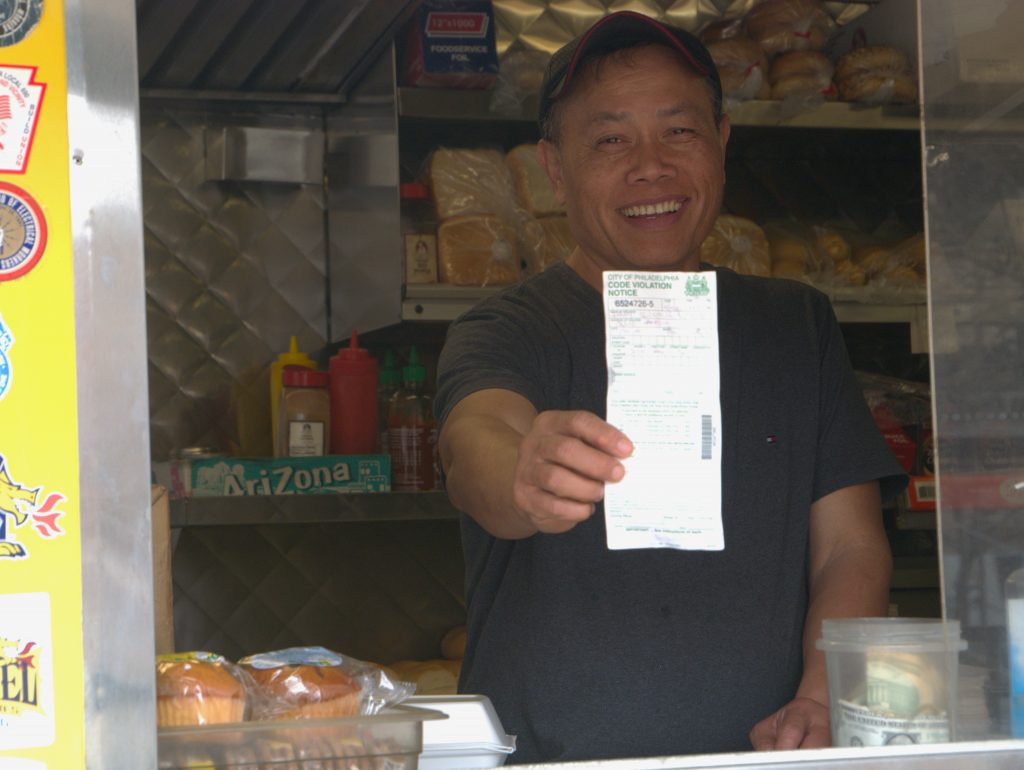
Posted in UncategorizedComments Off on Councilwoman Gauthier rebukes city responsibility in Drexel’s food truck crackdown
Councilwoman Gauthier rebukes city responsibility in Drexel’s food truck crackdown
Posted on 04 April 2025.

After Drexel attributed their actions regarding campus food trucks to the longstanding laws of Philadelphia and urged students to reach out to the Philadelphia City Council, District 3 councilmember Jamie Gauthier responded that Drexel was not being told to enforce these laws. She instead urged the university to listen to its students and community.
Gauthier explained that while the city does have a law preventing food trucks from parking overnight, it is intentionally enforced selectively. This statement contradicts claims made by the Drexel administration at Monday’s forum that the lack of enforcement was purely due to a lack of resources in the PPA and city police.
In an interview with Fox News, she expressed disappointment and frustration with Drexel for not listening to their students and targeting these food trucks.
“I was somewhat dismayed that they were telling the student community this was because of something that I did,” Gauthier stated. “I would never be a part of any movement to push food trucks off of the campus and in fact I would hope that Drexel would reverse course on this but if they don’t, I’m going to be exploring legislative options to make sure we continue to welcome food trucks to West Philadelphia.”
The City’s Department of Licenses and Inspections, another group cited by Drexel to be a key player in this situation, told Fox News that “Drexel University is performing the enforcement, so they would be the appropriate contact.”

Gauthier followed this interview with a post on Instagram further pressing Drexel to stop targeting these beloved campus food establishments. Drexel University’s Undergraduate Student Government Association also posted an update on their Instagram featuring a video from Gauthier speaking out about City Council’s role in the situation.
Several food trucks around campus already received fines, some as early as 12:39 a.m. this morning.

Pete’s Little Lunch Box, Kami, Happy Sunshine, and other food trucks around campus have reported receiving fines of $150 this morning. According to several students, plans for a formal protest are in development.

Posted in UncategorizedComments Off on Councilwoman Gauthier rebukes city responsibility in Drexel’s food truck crackdown
Drexel defends stance on food truck fiasco
Posted on 02 April 2025.
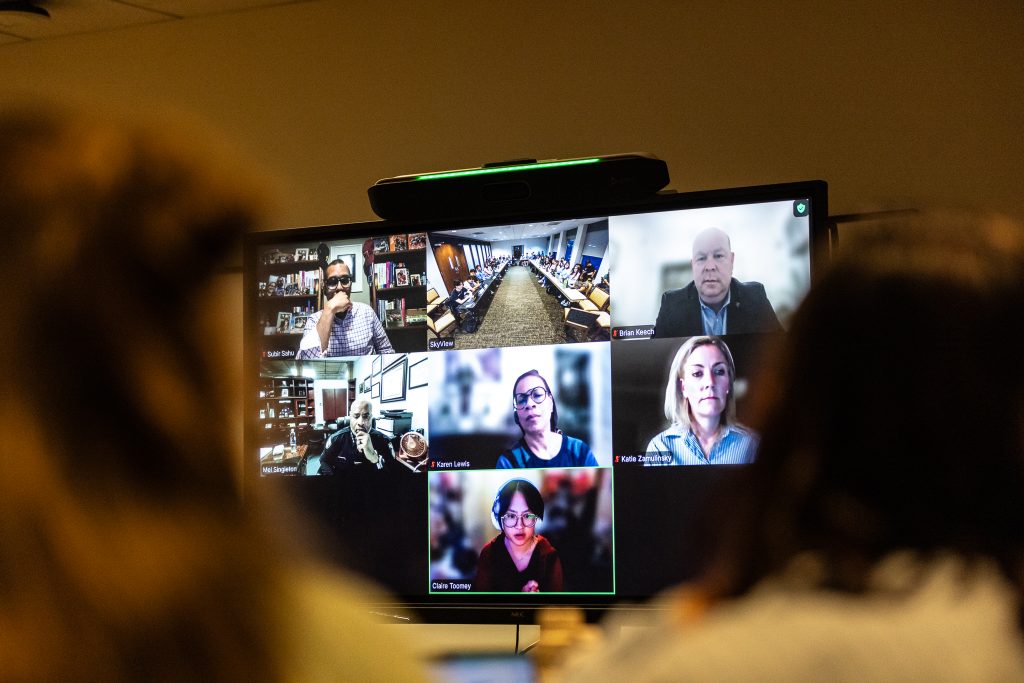
On Monday, March 31, Drexel University’s Undergraduate Student Government Association hosted an open forum with Drexel administrators for concerned students following the recent announcements of beloved campus food trucks moving or closing their businesses for good.
USGA welcomed senior vice presidents Subir Sahu and Brian Keech, Chief of Drexel Police Mel Singleton and associate vice presidents Karen Lewis and Katie Zamulinsky. They opened with introductions and their agenda for the forum. After explaining the situation and providing some background, they opened up the forum for Q&A.
Several of the Drexel panelists highlighted that they empathize with students’ concerns and understand that Drexel’s food trucks are a staple of the university and integral to the fabric of the community. They then clarified that their top priority is health and safety.
Chief Singleton explained that university police have been writing citations to food trucks around campus for years and have always tried to enforce Philadelphia law. They described several past incidents involving mobile vendors in the area, referencing the food truck that exploded near Temple’s campus in 2014. Recently, new food trucks outside of Summit have sparked numerous complaints from students. Moreover, Singleton cited the safety of those crossing the street with little space between the trucks.
As a result, Public Safety decided they needed to crack down uniformly on code violations by all mobile food services on campus. Singleton added that they have handed out numerous flyers in the past with safety tips and education on laws and standards.
Keech and Chief Singleton both stressed that they are not forcing the trucks to shut down or kicking anybody off campus, but are only asking the trucks to be compliant with the laws put in place by the city of Philadelphia. These laws outline when they can operate, when and how often they need to be cleaned and when and where they can park. The main issue causing Pete’s Little Lunch Box to close their doors is that they may not “leave any conveyance unattended at any time or store, park, or leave [it] overnight on any city sidewalk or street.”
When the forum was opened to questions from USGA students in the room and concerned students who attended remotely, USGA senator Nolan Wazni asked why Drexel’s response to these safety concerns was focused on food trucks, rather than the incessant traffic violations on 34th Street that occur irrespective of the food trucks.
Singleton and Keech responded to this by saying they were looking at the traffic problems in that area, but that solving them is much harder, citing the amount of work required just to install the new crosswalk on Chestnut Street.
Other students asked if there were records of the complaints and code violation citations and if this is a new issue or a change in enforcement of a longstanding issue. It was not made clear whether citation records were publicly available, but according to Keech, these issues do not often result in a citation, but rather a conversation with the owners that generally results in compliance.
Claire Toomey, the Drexel student who started a petition to help keep Pete’s Little Lunch Box open, asked if there was any way for Drexel to help Pete’s and other food trucks to maintain their spots. Keech said they have considered offering reserved spots for trucks that would still have to park somewhere else overnight or turning the parking lot behind the Academic Building into a private place just for mobile vendors. This new private location, much like “Food Truck Alley” on Ludlow Street, would not be subject to the same rules and regulations as a public road. However, these proposals have not been implemented due to the complicated nature of the situation, with many groups having to come together to make them happen.
The panelists continuously reiterated that they were not forcing any trucks to close or leave Drexel’s campus; they were only providing them notice that they need to be in compliance with Philadelphia law. They urged students not to pick their battle with Drexel, but rather with District 3 councilmember Jamie Gauthier and the Philadelphia City Council, who have control over these laws.
Posted in UncategorizedComments Off on Drexel defends stance on food truck fiasco
